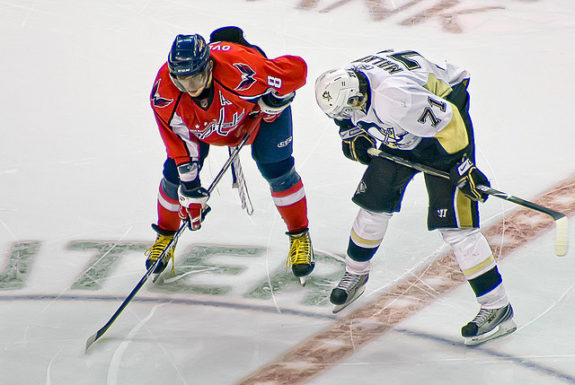With a new plan for realignment all but finished, it looks like there won’t be much changing for the Pittsburgh Penguins. There are still undoubtedly some kinks to be worked out, and the NHL has left the door wide open for expansion with the unbalanced divisions. But as it stands now, the current Atlantic Division will remain intact adding Washington, Columbus and Carolina to the mix.

Here’s the full breakdown from Elliotte Friedman:
Eastern Conference
Atlantic Division: Carolina, Columbus, New Jersey, New York Islanders, New York Rangers, Philadelphia, Pittsburgh, Washington.
Central Division: Boston, Buffalo, Detroit, Florida, Montreal, Ottawa, Tampa Bay, Toronto.
Western Conference
Midwest Division: Chicago, Colorado, Dallas, Minnesota, Nashville, St. Louis, Winnipeg.
Pacific Division: Anaheim, Calgary, Edmonton, Los Angeles, Phoenix, San Jose, Vancouver.
The Good News
The first thing that jumps off the page is that Washington will once again be a division rival. Even though the Crosby/Ovechkin rivalry has waned of late, Pittsburgh’s history goes back a lot farther with Washington, and it will be great to see them reunited with their former Patrick Division foes. I also really like Carolina coming to the division. While there may not be too much history between the Pens and Hurricanes, Jordan Staal’s presence in Raleigh will make it an intriguing match up for years to come. And with Columbus only a three hour drive from Pittsburgh, it shouldn’t take too long before those two teams and fanbases get acquainted and start hating each other.

The best news is that the Penguins will not have Detroit in their division. Of the two teams moving to the East from the West, the Atlantic definitely got the better end of the bargain – from a competitive standpoint. I’m very bullish on Columbus’ future, don’t get me wrong. I think Jarmo Kekalainen stands a very good chance of turning that team around, and yes, Detroit looks like a mere shell of their former selves without Nicklas Lidstrom. But I’ll take a matchup against Vinny Prospal and Mark Letestu over Pavel Datsyuk and Henrik Zetterberg 100 times out of 100.
The Bad News
The downside to all of this is that the road to the playoffs is about to get a lot harder. Under the new system, the top three teams from each division will get in, plus two wildcards per conference from either division. For teams in the eight-team divisions, like the Penguins, they will need to be better than five other teams in their division to guarantee a non-wildcard spot, whereas the teams in the seven-team divisions will only have to be better than four others. But, as Jeff Little explains, unbalanced conferences are nothing new, may end up not being that big of a deal:
[The] fact is that between the initial NHL expansion in 1967 and the completion of the most recent expansion in 2000, the conferences were unbalanced for 18 years, and equally distributed in 16 years. The sun rose every morning, and no cataclysmic event resulted from this disparity.
As for the wildcard spots, the teams in the Atlantic are at a disadvantage compared to those in the new Central – based on how the Southeast division is being split.
Washington and Carolina have been far more successful historically than Tampa Bay and Florida. Since inception, Carolina has won the Southeast three times and Washington has won it six times. Tampa Bay has only won twice and Florida once. Adding Detroit to the Central evens out the disadvantage a bit but it very possible that the 6th team in the Atlantic could have a better record than the third team in the Northeast and still miss out on the playoffs.
Don’t Get Too Comfortable
All of this could still change, as well. Even if the deal goes through as planned, the league is leaving themselves an out.
Again, from Elliotte Friedman:
The league-wide memo indicates the NHL and the NHLPA will meet after the 2015-16 season to see if this is working, “or earlier if circumstances warrant.”
And if they expand, like I expect them to, it’s likely they’ll need to reshuffle again since the likely candidates to get a new team (Hamilton, Quebec City) will need to be slotted in the east. So don’t be surprised if all this goes out the window in a few years.